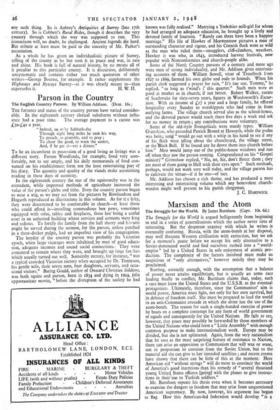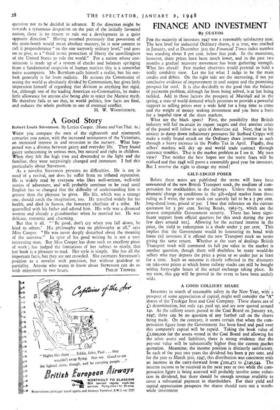Marxism and 'the Atom
The Struggle for the World. By James Burnham. (Cape. 10s. 6d.)
The Struggle for the World is argued belligerently from beginning to end in a series of generalisations which the author never tires of reiterating. But the desperate urgency with which he writes is eventually confusing. Russia, with the atom-bomb at her disposal, may well threaten Western civilisation with extinction, but we ask for a moment's pause before we accept his only alternative to a Soviet-dominated world and find ourselves rushed into a " world- empire " led by a United States in sole enjoyment of atomic pro- duction. The complexity of the factors involved must make us suspicious of "only alternatives," however noisily they may be proclaimed.
Starting, correctly enough, with the assumption that a balance of power never attains equilibrium, but is usually an arms race leading finally to conflict, Mr. Burnham claims that, today, such a race must leave the United States and the U.S.S.R. as the eventual protagonists. Ultimately, therefore, since the Communists' aim is world power, America must fight, not only for her own survival, but in defence of freedom itself. She must be prepared to lead tht world in an anti-Communist crusade in which she alone has the use of-the atom-bomb. The reason for such a single-handed exercise of power he bases on a complete contempt for any form of world government of equals and consequently for the United Nations. He fails to see, however, that peace may possibly be forwarded by those- members of the United Nations who could form a " Little Assembly" with enough common purpose to make internationalism work. Europe may be divided, but she is not splintered. Again, from the very nationalism that he sees as the most surprising feature of resistance to Nazism, there can arise an opposition to Communism that will wax or wane, not ,in proportion to coercion from the 5oviet Union, but to the material aid she can give to her intended satellites ; and recent events have shown that there can be little of this at the moment Here American aid " without strings " will do more to- convince 'the world of America's good intentions than his remedy of " several thousand young Unitect ,States officers igoing] with the planes to give instruc- tions in their'use to Turkish soldiers."
Mr. Burnham• repeats his thesis even when it becomes necessary to examine the dangers to freedom that may arise from unquestioned American supremacy. By now, however, his argument has begun to flag. How this American-led federation would develop "is a question not to be decided in advance. If the direction might be towards a tyrannous despotism on the part of the initially favoured nation, there is no reason to rule out a development in a quite opposite direction." Having assumed previously that possession of the atom-bomb would mean absolute mastery, he is now content to call it preponderance " on the one narrowly military level," and goes on to give, as a " third ironic protection of liberty the unwillingness of the United States to rule the world." For a nation whose con- stitution is made up of a system of checks and balances springing from a fundamental suspicion of human motives this is a somewhat naive assumption. Ms Burnham calls himself a realist, but his out- look generally is far from realistic. He accuses the Communist of seeing the world as absolutely divided by Communism, but gives little impression himself of regarding that division as anything but rigid, for, although one of the leading American ex-Communists, he makes little allowance for anyone else being able to reject the Marxist myth. He therefore fails to see that, in world politics, few facts are final, and reduces the whole problem to one of eventual conflict.
M. W. WOODTHORPE.







































 Previous page
Previous page